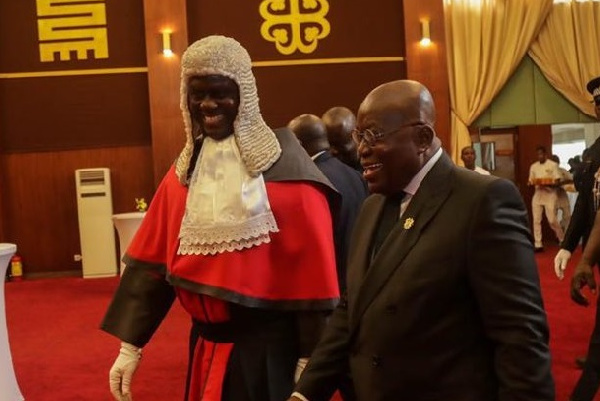Mr Tameklo explained in an interview with Alfred Ocansey on the Sunrise show on 3FM Tuesday, August 24 that details of a petition of this nature, per the 1992 constitution, should not be in the public domain.
However, he noted, all the details were published in the public space.
“You wouldn’t want to say it was not strong enough, it has its own constitutional challenges. Because of the precedence in Frank Agyei Twum that the petition of this nature needs a certain level of confidentiality.
“So the confidentiality threshold is a constitutional threshold [but] the details were in the public domain, that violated the confidentiality Clause because they said the proceedings should be in camera and the thing that triggered that proceedings is the petition. So if the petition has a defect then it cannot originate the process of the enquiry.
“If you are minded to petition for the removal of the president it is a highly confidential matter,” the member of the National Democratic Congress (NDC) said.
President Akufo-Addo on Monday August 23 dismissed a petition filed by the Executive Director of ASEPA Mensah Thompson.
ASEPA boss had invoked Article 146 (6) of the Constitution of Ghana, 1992 for the removal of the Chief Justice. The petition followed allegations by a private legal practitioner Kwasi Afrifa who alleged the Chief Justice demanded a $ 5 million bribe from his (Afrifa’s) former client for a favourable judgment.
Accordingly, the President in a letter dated July 20, 2021, consulted with the Council of State per the terms of Article 146 (6) to determine whether the petition discloses a prima facie case against the Chief Justice. Such a determination should precede the appointment of a committee under Article 146 (6) to hear the matter.
The Council of State conveyed its conclusions on whether or not a prima facie case has been established to the President on Friday, August 20.
In making a determination on whether or not a prima facie case has been established against the Chief Justice to warrant the appointment of a committee for the purpose of inquiry, the President said, on the generality of the fact available vis a vis the applicable legal rules, the petition fails to meet the threshold specified in law.
“This allegation by ASEPA, assuming the same to be true, is conjectural, speculative and provides nothing of substance to assist in proceedings under Article 146 of the Constitution.
“The petitioner fails to meet the threshold of proffering strong evidence in support of his allegations for the opposing side to be called to answer to it. In actual fact, the petitioner fails to provide any evidence at all, in support of the spurious allegations made against the Chief Justice,” parts of the letter read.
“Applying my mind to the demands of the task before me, I have no hesitation in finding that the petitioner’s complaint does not disclose a prima facie case for further action to be taken under Article 146 (6) of the Constitution,” it added.
Consequently, the president dismissed the petition describing it as “unmeritorious” and “unwarranted”.
It is recalled that on Tuesday, August 3, the presidency described an action by Mensah Thompson to publish a response on the petition on Social media as irresponsible and ill-advised.
The presidency further said Mensah Thompson should not only be mindful that the processes were confidential but be guided accordingly so as not to be in contempt of the Supreme Court.
“Firstly, we note that within minutes of picking our letter dated 26th July 2021 with reference number OPS307/21/843 from the office of the president. You caused it to be circulated on social media.
“We consider such behavior highly irresponsible and ill-advised. You are reminded per Article 146 (8) of the constitution all proceedings under article 146 shall be held in camera. The Supreme Court has interpreted this to include the petition and all incidental papers, thus you should not only be mindful that be the processes are confidential but be guided accordingly so as not to be in contempt of the Supreme Court
“Your request for the suspension of the Chief Justice pursuant to Article 146(10) is premature as there has not been any appointment of a committee to inquire into the petition you submitted.”

















![EC Announces Elimination of Indelible Ink in Upcoming Elections [Video]](https://newsonghana.com/wp-content/uploads/2023/12/image-351-218x150.png)






































